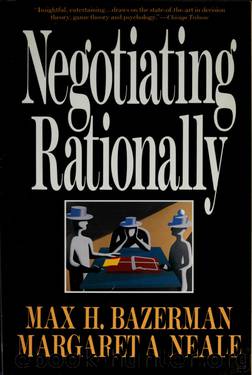Negotiating rationally by unknow

Author:unknow
Language: eng
Format: epub
Tags: Negotiation, Negotiation in business, Onderhandelen, Négociations, Négociations (Affaires), Verhandlung, Wirtschaft
ISBN: 0029019869
Publisher: New York : Free Press ; Toronto : Maxwell Macmillan Canada ; New York : Maxwell Macmillan International
Published: 1992-01-14T02:00:00+00:00
2 40
> 30
20 -
10 -
0 I L
Mean Bids Across Trials
J I I I I I I I I L__l
1 2 3 4 5 6 7 8 9 10 11 12 13 14 15 16 17 18 19 20
Number of Trials
Figure 12.1 "Acquiring a Company"—The Lack of Learning
unclear, delayed, or not given in a meaningful way. In addition,executives often have a psychological investment in the choicesthey make, reducing how open they are to feedback about theirdecisions. If a manager's self-esteem depends on the outcome ofthe decision, this can make him or her see ambiguous feedback asmore positive than it really is.^
Consider how difficult it is for your employees to hear andincorporate negative performance evaluations. Faculty often seemunable to hear (or let themselves acknowledge) negative feedbackin their contract renewal or tenure review process. Most facul-ty who are denied tenure say they are surprised by the deci-sion, regardless of the amount and type of negative feedback pre-viously conveyed to them and documented in their personnelrecords.
Even if managers correctly understand relevant and meaningfulfeedback, that information still must be stored in their memoryand then retrieved to be considered in later decisions. As wediscussed earlier, memory storage and retrieval are influenced bymany irrelevant factors. We are not contesting that people learnfrom experience—that is obviously true. We believe, however,that learning from experience does not usually produce the type ofunderstanding that you need for true expertise. To be an expert at
anything, you have to combine experience with rational thinking.
Thinking rationally about negotiation requires that you be ableto discern a negotiation's most important aspects, know why theyare important, and know what strategies will be most effective toresolve the dispute and maximize your outcome. This perspectiveallows you to assess when and why a particular strategy will beeffective. Instead of relying upon uncertain or uncontrollablefeedback, you can develop expertise by knowing what informationyou need to monitor and what you can ignore.
This is no small accomplishment. Because there are manypossible strategies and options for any task you face, a wealth ofinformation competes for your attention. If you can focus on whatis relevant, you increase your chances of getting feedback that ismeaningful enough to direct you to the best decisions.
A good framework for thinking about your choices makes anyfeedback more relevant. The wrong framework only distorts yourperceptions and your judgment.
Consider a study in which we examined the ability of nego-tiators to generalize their experience in one situation to other,similar situations.'^ Negotiators participated in either a distribu-tive or an integrative negotiation. The results were quite consist-ent: regardless of the type of negotiation first experienced, nego-tiators didn't do well when confronted with a new negotiation taskthat incorporated both distributive and integrative components.We then gave half of each of the groups training that matchedtheir experience. Half of the subjects who had experienced a dis-tributive negotiation received distributively oriented training;half of the subjects who experienced an integrative negotiationreceived integratively oriented training. The results were very in-teresting.
Those with both training and experience negotiated significant-ly better outcomes than those with experience alone. With trainingabout the concepts behind negotiation, they were better able tothink rationally about their own negotiation.
Download
This site does not store any files on its server. We only index and link to content provided by other sites. Please contact the content providers to delete copyright contents if any and email us, we'll remove relevant links or contents immediately.
The Motivation Myth by Jeff Haden(5212)
Audition by Ryu Murakami(4929)
Adulting by Kelly Williams Brown(4574)
The Confidence Code by Katty Kay(4258)
A Mind For Numbers: How to Excel at Math and Science (Even If You Flunked Algebra) by Barbara Oakley(3305)
Waiting in the Wings by Melissa Brayden(3218)
Self-Esteem by Matthew McKay & Patrick Fanning(3144)
Fooled by Randomness: The Hidden Role of Chance in Life and in the Markets by Nassim Nicholas Taleb(3123)
The ONE Thing by Gary Keller(3070)
Nice Girls Don't Get the Corner Office by Lois P. Frankel(3044)
The Dictionary of Body Language by Joe Navarro(2996)
How to be More Interesting by Edward De Bono(2791)
Designing Your Life by Bill Burnett(2745)
Getting Things Done by David Allen(2698)
The Plant Paradox by Dr. Steven R. Gundry M.D(2620)
Police Exams Prep 2018-2019 by Kaplan Test Prep(2546)
What Color Is Your Parachute? 2015 by Richard N. Bolles(2311)
Dangerous Personalities by Joe Navarro(2289)
When to Jump by Mike Lewis(2241)
